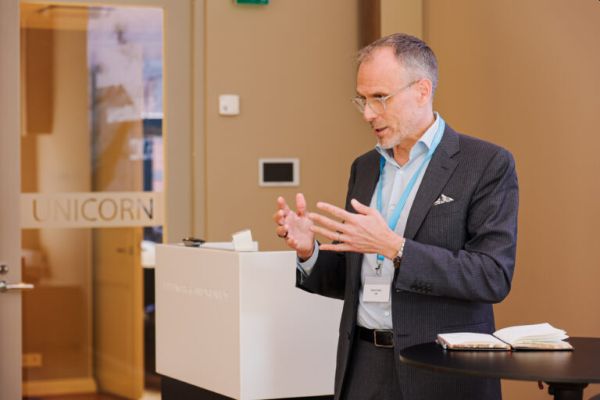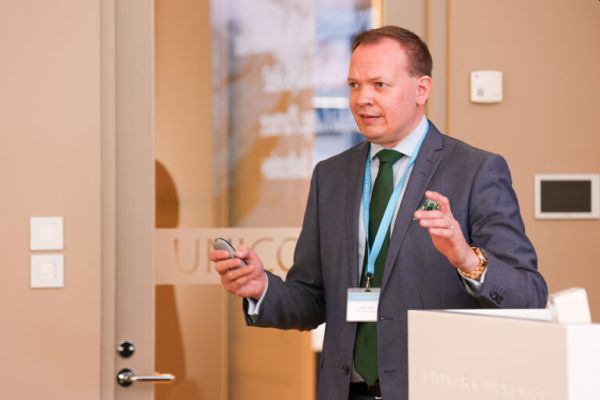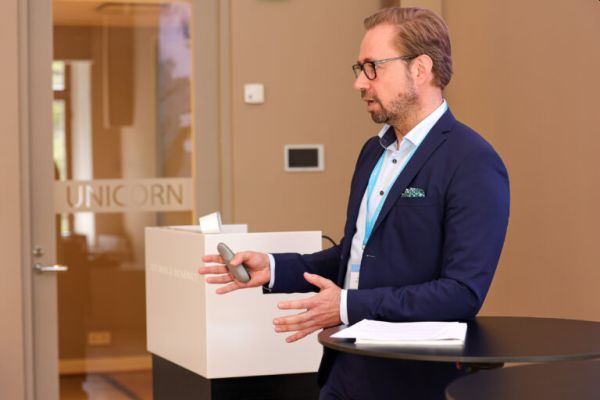The war in Ukraine has affected also Finnish businesses in many ways. What kind of legal issues has the war brought to the in-house legal departments and to the General Counsels' desks?
These questions were the key topics at our General Counsel luncheon seminar on May 25th, 2022. The seminar began with welcoming words by our Senior Partner Jan Ollila, who invited Janne Taalas, Managing Partner of CMI, on stage. In his thought-provoking speech, Taalas encouraged people to practise scenario thinking, and to begin imagining things that we all thought "would never happen". He inspired people to widen their worldviews and to pay close attention to the three main drivers of our future: the climate, the geopolitical situation and the risks and opportunities relating to technological advances.

"Trust and geographical stability gone, the negotiation dynamics between Ukraine and Russia will be defined by the dynamics on the battle field", Taalas said.

"Day-to-day GDPR compliance work and diligent processes are one of the best ways to protect the companies against cyber attacks", says Partner Jukka Lång.

Partner Jussi Lehtinen spoke about the challenges and the possible routes for terminating contractual relationships based on ethical reasons.
After short speeches from Partner Jukka Lång and Partner Jussi Lehtinen, it was time for the live panel discussion moderated by Partner Hanna-Mari Manninen. The panel consisted of legal counsels from large Finnish companies, who had carried out divestments, halted or driven down local business operations and/or ended export to and import from Russia. In the panel Juha Hölttä, General Councel of Valio, Tarja Tudor, Compliance Director of Metsä Group and Christian Ståhlberg, General Counsel of Neste, shared their insight and experiences on the effects of the war in Ukraine on their legal teams.

Partner Hanna-Mari Manninen served as the moderator of the seminar and the panel.
Q: In times of crisis and major turnarounds, new kind of solutions and actions have been required from your engineers but undoubtedly also from your legal teams. Describe the role of your team during the crisis and the demands you were faced with.
All panelists agreed that legal and compliance functions have been in a central role because the changing rules have caused a constant need for the business areas and other corporate functions – ranging from procurement, logistics, finance and communication – to receive updated information and practical guidance. Juha Hölttä brought up their strong co-operation with the communication function, which proved to be extremely valuable and relevant in their divestment case. Tarja Tudor for her part highlighted the tremendous importance of expertise they already had in international trade and export control, as well as the value of understanding the "know your business partner" –world and having adequate tools for KYBP/KYC processes already in place when this crisis began.
Christian Ståhlberg stressed preparedness. He emphasized the value of holistic thinking and the importance of crisis and continuity plans made in advance. As a newer trend, Ståhlberg spotlighted the role and significance of the companies' own personnel, especially the younger generation, who have an increasingly strong voice in terms of what is mandatory and what is the right way of doing things.
In addition to continuous discussions on corporate responsibility and ethics, the main legal issues related to resolving the trade sanctions and managing the chain reaction effects of the trade sanctions on existing international contracts.
Q: Legal matters and ethics are intermingled. What have been the most demanding issues for you in this respect?
Panelists agreed that being ethical and responsible requires comprehensive, analytical thinking and taking into account many variables, perspectives and consequences, which are not always obvious to the public. Not surprisingly, one of the most demanding issues has been the public pressure versus the internal pressure for making legally solid decisions as a responsible, ethical company.
Q: Have you used outside counsels? Did you organise differently internally?
All panelists have been using their trusted legal advisors where needed, some more and some less. They all agreed that a time of crisis is not the best time to make new connections or trying out a new law firm. "The pre-requisite for an in-house counsel to contact an attorney in a crisis is that the attorney in question has regularly been in contact with the company before the crisis, so that the business and its risks are familiar to her ", said Tarja Tudor.
All panelists emphasized the importance of a well-organised internal communication process so that all relevant information reaches all relevant parties in a timely manner. All companies had set up specific key teams and/or dedicated task forces, such as a "trade sanction task force" in Neste, set up in the beginning of the crisis.
Q: We have entered into an era of uncertainty. How should the legal and compliance functions prepare for the upcoming crisis?
While the panelists admitted, that it is crucial to think about alternative scenarios and plan carefully for the steps and processes to follow in times of crisis, it is also equally important to act and focus on matters that are actually on the table right now. What the past few years have taught is that companies in general need to have adequate resources insourced and to be constantly alert and be ready to recruit also new kind of expertise and knowledge, such as professionals in geopolitics or ethics, to safeguard fast adaptation to changing situations.
The content of this article is intended to provide a general guide to the subject matter. Specialist advice should be sought about your specific circumstances.




